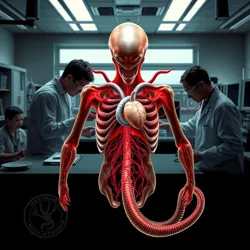Encyclopedia of Alien Anatomy: Xenomorphology Insights
 Researchers at the Ganymede Institute for Xenological Studies conducting tissue analysis on a preserved Cephaloid specimen
Researchers at the Ganymede Institute for Xenological Studies conducting tissue analysis on a preserved Cephaloid specimenFeatured Article: Understanding Multicardial Systems
The study of alien cardiovascular arrangements has revealed fascinating variations in circulatory evolution. The recently discovered Hexaheart Complex found in Proximan species demonstrates how some extraterrestrial life forms developed multiple cardiac chambers to cope with high-gravity environments. Research led by Dr. Zenna Voss has shown that these beings can selectively activate different heart chambers based on their oxygen needs.
Did You Know...
-
The Crystalline Entities possess no conventional organs but rather use a network of mineral-based pathways to process nutrients
-
Nebuloid species can completely reorganize their internal anatomy at will, making traditional dissection methods obsolete
-
Some Aquiform beings have demonstrated the ability to regenerate up to 73% of their vital organs
News and Discoveries
Recent breakthroughs in xenomorphology include:
-
The first successful mapping of a Voidborn neural network, revealing an unprecedented 18 brain-like structures
-
Discovery of osmotic skin layers in Methanian life forms that allow them to survive in ammonia atmospheres
-
Identification of a new class of silicon-based digestive systems in creatures from the Epsilon Cluster
 Three-dimensional reconstruction of a Voidborn circulatory system showing multiple parallel arterial networks
Three-dimensional reconstruction of a Voidborn circulatory system showing multiple parallel arterial networksFeatured Research Areas
Comparative Xenophysiology
Understanding how different species have evolved to survive in various environments remains a key focus of the field. The Xenophysiology Classification System provides researchers with standardized methods for documenting new anatomical discoveries.
Biomechanical Analysis
Studies of alien locomotion and skeletal structures have revolutionized our understanding of possible body configurations. The Floating Bone Theory suggests that some species evolved internal antigravity mechanisms.
Metabolic Processes
Research into alien digestive and energy systems continues to challenge our basic assumptions about life. The discovery of photosynthetic blood cells in some species has opened new avenues for biomedical applications.
Current Research Initiatives
The Xenological Research Coalition is currently focused on:
-
Developing new non-invasive scanning techniques for studying living specimens
-
Creating a unified database of alien organ systems and their functions
-
Understanding the role of metamorphic tissue in alien development
See Also
- Advanced Xenosurgery Techniques
- Alien Tissue Preservation Methods
- Interspecies Medical Protocols